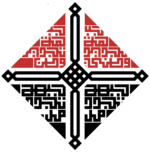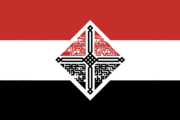National Renovation Front
National Renovation Front جبهه تجدد ملی Jebhe-e Tajaddod-ye Melli جَبْهَة تَجْدِيد وَطَنِيّ Al-Jabha al-Tajdīd Waṭaniyy | |
|---|---|
 | |
| Secretary-General | Vahid Isfandiar |
| Federal Leader | Farzad Akbari |
| Deputy Federal Leader | Saad Al-Sadoun |
| Founded | March 9, 1979 |
| Preceded by | Revolutionary Masses Party |
| Newspaper | Khordad |
| Student wing | Young Thinkers of the Union |
| Youth wing | Young Companions of the Union |
| Women's wing | All-Union Womens Federation |
| Trade union | All-Union Workers Federation |
| Membership (2020) | |
| Ideology | Sattarist Renovationism |
| Political position | Big-tent right-wing to far-right (disputed) |
| Religion | Irfan |
| Colors | Black, red, white |
| Supreme Assembly of the Union | 530 / 530
|
| Union Republic Assembly seats | 2,250 / 2,250
|
| Provincial Assembly seats | 13,440 / 13,440
|
| Election symbol | |
 | |
| Party flag | |
 | |
The National Renovation Front (NRF) (Pasdani: جبهه تجدد ملی; Jebhe-e Tajāddod-ye Melli; Rahelian: جَبْهَة تَجْدِيد وَطَنِيّ; Al-Jabha al-Tajdīd Waṭaniyy) is the founding and sole governing political party and entity of the Union of Zorasani Irfanic Republics (UZIR). The NRF though the sole legal political party, operates a vast network of subordinate organisations that cover virtually every aspect of daily social, political and cultural life. The NRF was founded on 3 September 1979, as the legal successor to the Revolutionary Masses Party, and in preparation of Zorasani Unification. The NRF inherited the RMP's organisational structure and membership, but grew exponentially following the 1979 Union Referendum and the oversaw the establishment of the UZIR in 1980. The party has governed the UZIR continiously since, though due to its organisational nature and setting within the Zorasani political framework, it is subordinate to the Zorasani Irfanic Revolutionary Army, as the Revolutionary Masses Party was formed as the political wing of the Pardarian Revolutionary Resistance Command in 1925.
The NRF is organised in accordance to the notion of Čekâd (Peak), in which the leadership as the peak, dominates the party-levels below in a highly centralised top-down manner, while bottom-up, the party-levels are subordinate to the one immediately above it. Čekâd also entails the open discussion and debate on policy (any level of the party may propose policies or changes), though the Čekâd or party leadership makes the final decision, and party-wide unity is mandated on the final decision and its enaction. The top-decision making body of the party is the Revolutionary Command Committee and meets weekly and is comprised of the seven most senior members of the Council of Union-Ministers and three most senior members of the Central Command Council, as such as the Revolutionary Command Comittee as seen as the top leadership of not just the party, but of the State as well. Below the RCC is the Union Command Congress, an annual meeting of the party's most senior delegates, where policy is debated and the prior year's policies and party-leadership records are evaluated. The Secretary-General of the Front, who organises the party's administration also holds the office of State President of the Union (ceremonial head of state), while the Federal Leader, who chairs the RCC serves concurrently as First Minister, the powerful head of government. The current Secretary-General is Vahid Isfandiar and Federal Leader is Farzad Akbari both elected at the 8th Union Command Congress in 2014.
According to the NRF's founding charter, the party adheres to Sattarist Renovationism, the same as its predecessor, the Revolutionary Masses Party. However, the ideology adopted at its founding in 1979 is markedly different from that of the RMP, with the abandonment of socialism, a command economy and secularism. The ideology of the NRF has been described as Neo-Sattarism, with a notable inclusion of Politcal Irfan, corporatism, also described as state capitalism and theorised militarism. The NRF's ideological basis is described as "perpetual motion through perpetual renovation and evolution of the Union." In recent years, many have also described the NRF as adopting a nascent form of Pan-Irfanism.
The party maintains ties with a variety of political movements and groups across Coius, as part of the network inherited from the RMP in 1979. These include numerous dominant parties in Bahia and southern Coius, with a primary focus on parties that are dedicated to anti-imperialism, whether they're left-wing or right-wing. With 18.6 million members it is one of the largest political parties in the world.